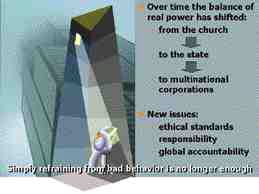
News
The Sustainable Business: New paradigms beyond share-holder value
November 1, 2001 By Pulp & Paper Canada

In last month’s column, we covered the “The end of shareholder-value” and the emergence of a more holistic stakeholder-value model for corporate governance. Research at PhilipsDesign [http://www.desig…
In last month’s column, we covered the “The end of shareholder-value” and the emergence of a more holistic stakeholder-value model for corporate governance. Research at PhilipsDesign [http://www.design.philips.com/] reveals more on the important societal trends behind this transformation. In a world increasingly dominated by multinational corporations, it is starting to make business sense to invest in social and
environmental accountability. Furthermore, the substance that lies behind the brand will be a key focus, as social and environmental performance will become important brand equity components.
Through privatization, economic deregulation and globalization, power has moved from governments to multinational corporations. Some 500 multinationals now control 70% of the total world trade. About 50 of the top 100 economies in the world are multinational corporations, not countries. We now rely on corporations, not governments for transportation, communications, providing heat and water…etc. It makes business sense for companies to also consider environmental and social issues, because there is a new social consciousness. People will “vote” by supporting companies that are in tune with these new values — so-called ethical mutual funds are attracting substantial public investment. Business will be “elected” by consumers, investors and prospective employees, not only in terms of economics, but also based on their public image. “Ensuring and protecting a company’s reputation will become the challenge of the next decade” – Glen Peters, Pricewaterhouse Coopers.
Pricewaterhouse Coopers has played a key role in developing an international set of guidelines [Reputation Assurance – RA5], where there are 27 common principles to ensure environmental and social standards in organizations. KPMG has launched an “ethical consulting” service. ISO has developed the ISO 140001 standards for environmental management, and the Council for Economic Priorities has released the SA 8000 standards for social accountability. The top 100 corporations for business ethics can be viewed at www.business-ethics.com. In our own backyard, we have the emergence of the Forest Stewardship Council to establish stakeholder-accepted standards for forest practices. A San Francisco-based group, Business for Social Responsibility, has grown from 45 members in 1993 to over 1400 members today, and includes Fortune 500 companies such as General Motors and Coca Cola. In the US alone, NGO’s [mainly single issue lobby groups] have grown from 29,000 to more than 100,000 in the last 8 years. Power brands are increasingly becoming public property — social and environmental identity are becoming components of brand equity.
As a consequence of these trends, businesses will experience increased media attention, increased public scrutiny, increased expectations and a demand to deliver social value. New services [www.ewatch.com] allow companies to keep their finger on the pulse of public opinion concerning their affairs. The so-called “new business” will be judged on openness and ethics, honesty, social responsibility, environmental responsibility, profitability, future competitive advantage and brand reputation. “Companies that will prosper in the future, will be the ones that get the balance right,” – Glen Peters, Pricewaterhouse Coopers.
In the future, corporate branding will become more important and businesses will have to live by their brand values. Global transparency will make it impossible to have a public face and a different set of operating rules. This means that business will have to do some soul searching to discover their true values and purpose.
Why is this important?
Increasingly, employees want to feel good about the company that they work for and what it stands for. This will clearly have impacts on the company’s ability to attract and retain high performers. Customers, suppliers, partners, and consumers will also demand the same high standards. At a more fundamental level, socially responsible business people need to ask some tough questions about their activities:
Do customers really need our product, or just their function and services?
Might these products and services be “excessities” or are they necessities?
Are we creating genuine value for society?
The answers to these questions might open avenues for creating brand equity value. The Philips research has found that future customers will be seeking holistic and flexible solutions rather than simply products or technology. Many high profile companies have already recognized this business shift [Philips, IBM, Kodak, Johnson & Johnson, P&G, etc.], as have many high growth “up and comers.”
Alan R. Procter can be reached at futureviews@alanprocter.com. For more information, visit www.futureviews.net
Print this page